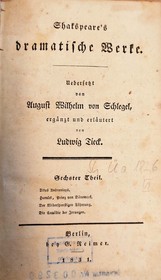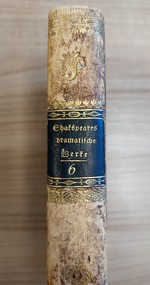Schlegel & Tieck "Shakespeare's Dramatische Werke"
August Wilhelm Schlegel & Ludwig Tieck: Shakespeare’s Dramatische Werke (1825-1833)
The translation of Shakespeare’s dramatic works into German by the philologist and literary historian August Wilhelm Schlegel and by the writer Ludwig Tieck remains one of the most important works of the German and pan-European Shakespeare reception. The LMU’s Shakespeare Research Library holds a valuable first edition of the Schlegel-Tieck translation (Berlin, 1825-1833). The work is a crucial source for studying practices of translating Shakespeare in the German-speaking world as well as for understanding the complex textual and editorial history of the Schlegel-Tieck version itself.
As early as 1789, August Wilhelm Schlegel had begun translating Shakespeare. The first play he turned to was A Midsummer Night’s Dream. By 1810, Schlegel had translated seventeen of Shakespeare’s plays and had begun publishing the plays in German to great acclaim. In 1819, under pressure to complete and publish further translations, Schlegel contacted the poet and writer Ludwig Tieck and asked him to undertake the translation of the remaining Shakespeare plays. Tieck agreed and shared this task with his eldest daughter Dorothea and the diplomat and writer Wolf Heinrich von Baudissin. The Schlegel-Tieck translation thus became a collaborative effort with four different translators involved in the project. During the 1820s, Ludwig Tieck also began to make changes and revisions to Schlegel’s existing translations.

Between 1825 and 1833, the Berlin-based publisher Georg Andreas Reimer printed and released a complete edition of the Schlegel-Tieck translations as a multi-volume work. The translations of this edition differ somewhat from previous versions of Schlegel’s individual translations as they contain Tieck’s revisions and changes. Letters from Schlegel to his publisher Reimer strongly suggest that Schlegel was disappointed with the results and that he had not been aware of the changes and revisions Tieck had made to his translations:
„Mein vortrefflicher Freund Ludwig Tieck hat sich einfallen lassen, meinen Shakspeare zu corrigiren. Ich warte auf den seinigen, um ihm die gleiche Ehre zu erweisen; aber ich werde, fürchte ich, vergeblich warten. […] Aber den Text durch vermeynte Verbesserungen zu interpoliren, das veränderte Buch unter seinen Namen zu stellen, und diesen solchergestalt bei der Nachwelt zu compromittiren, dazu kann niemand das Recht haben. Gesetzt auch, Sie hätten mir die Veränderungen zuvor mitgetheilt, und ich hätte sie wirklich für Verbesserungen erkannt, so würde ich dennoch meine Zustimmung verweigert haben, weil ich mir das Recht vorbehalte, noch einmal selbst meine Arbeit der Vollendung näher zu bringen.“
[Translation: My friend Ludwig Tieck dared correct my Shakespeare. I am waiting for his translation, so I can return the favour; but, alas, I am afraid I will wait in vain. […] To alter the text without acknowledgement or notification in the name of questionable improvements, and to market the changed book under his name, thereby compromising both the name and the work for posterity, surely no one has the right to do so. Even if you had notified me of the changes in advance, and even if I had felt that the changes were improvements to the text, still I would have refused my permission, because I reserve the right to bring my work closer to perfection myself.]
(Letter from August Wilhelm Schlegel to Georg Andreas Reimer. Bonn, Germany, 15 March 1825. This letter has been digitised and is available to read and view online here).
Following Schlegel’s complaint, Reimer and his team removed many of Tieck’s revisions from subsequent print-runs of the work. As a consequence, literary critics trace and assess the complex textual and editorial history of the work to this day. The first edition held at the LMU Shakespeare Research Library is of particular value because it is the only edition that contains Tieck’s alterations in full.

There is quite possibly no other Shakespeare translation which has also been subject to such intense debate surrounding the impact of a translator’s education and aesthetic programme for the translation itself. As Schlegel and Tieck were important cultural figures in the development of German Romanticism, the Schlegel-Tieck translation is often interpreted as a poetic rendition of Shakespeare in the spirit of German Romanticism.
Even though Tieck and Schlegel had vastly different approaches to the task of translating, the Schlegel-Tieck translation has played a key role in the reception of Shakespeare in the German-speaking world for almost two centuries and has become a cultural and literary phenomenon in itself.

